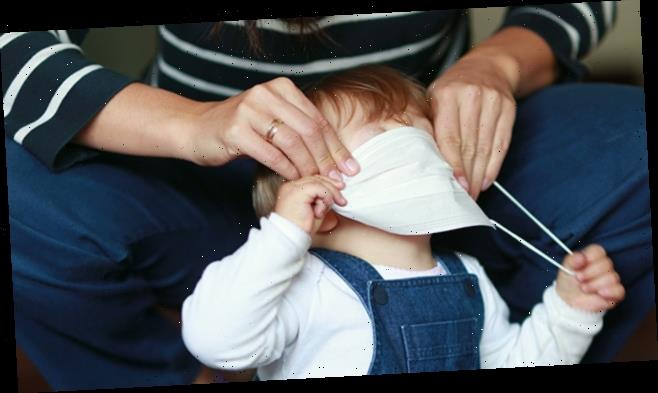Masks are the new normal for adults going out in public during the coronavirus pandemic, after the CDC issued its guidelines on face coverings earlier this month. But many parents have been wondering whether they’re supposed to be wrestling tiny masks and bandannas onto their children, when they venture out for exercise or necessary errands. Should the same rules apply to our littlest potential virus hosts?
Here’s the short answer from the CDC:
“Cloth face coverings should not be placed on young children under age 2, anyone who has trouble breathing, or is unconscious, incapacitated or otherwise unable to remove the mask without assistance,” reads a sentence tucked halfway down on a page about how to wear a face mask to prevent COVID-19 spread, so it’s easy to understand why most of us missed it.
Nationwide Children’s Hospital explained further why babies should definitely not wear masks.
“Baby’s airways are smaller, so breathing through a mask is even harder on them,” reads the site. “Using a mask on an infant may increase the risk of suffocation. Masks are harder to breathe through. A snug fit will give them less access to air, and a loose fit will not provide much protection.”
You may have also seen the super-cute photos of newborn babies in Thailand wearing plastic shields over their faces and wondering why we’re not putting those on our own infants. According to Smart Parenting, the Philippine Pediatric Society and the Philippine Society of Newborn Medicine have issued a warning that such coverings put babies at high risk of suffocation. They also say the cumbersome shields may discourage mothers from breastfeeding.
Given how we’re constantly trying to keep suffocation hazards from babies, it makes sense that we shouldn’t then be strapping one to their faces.
It also makes sense when you remember that the reason we’re all supposed to be wearing masks outside is not to protect ourselves from the virus but to protect others from any possibly undetected virus coming out of our nose and mouth. If you’re keeping your baby a safe social distance away from others, you don’t need to worry about them spraying someone else with “respiratory droplets.”
So, even if you’re seeing vendors advertising masks for babies and toddlers, do not buy them. When in doubt, follow expert advice, not ads and mom-shamers, when it comes to keeping your kids safe in the pandemic.
For kids over the age of 2, masks also aren’t always necessary, the American Academy of Pediatrics explains.
“If children can be kept at least 6 feet away from others, and not be in contact with surfaces that could harbor the virus, then they do not need a mask for the protection of themselves or others,” a post from the AAP reads. “For example, during a walk outdoors, as long as children can maintain social distancing of more than 6 feet and do not touch tables, water fountains, playground equipment or other things that infected people might have touched, then they will not acquire the infection and would not need masks. Places where a child would benefit from wearing a mask are places where they are likely to encounter other people at a closer than 6 foot range. For example, if you must take your child to the doctor, or the pharmacy or grocery store, and are unable to leave them at home, wearing masks in those settings could be beneficial.”
We think that if you anticipate having to put a mask on your kid eventually, you might want to have them wear it other places first, so they’ll get all that fussing and face-touching out of the way in a safe place. You’ll also have a better chance of getting them to accept wearing a mask if you make it fun, decorating their masks with a sticker or drawing of their favorite characters, or pretending you’re in superhero costumes. Amazon has begun selling some cartoon-decorated reusable masks for kids, and we love the options on Etsy. The AAP also recommends putting masks on stuffed animals and drawing then onto a book character.
You can also explain the coronavirus and masks, in an age-appropriate, not frightening way.
“An important way to reassure children is to emphasize how you are taking steps to stay safe,” the AAP states. “Children feel empowered and less afraid when they know what to do to keep themselves safe.”
Adults do too, for that matter!
Our mission at SheKnows is to empower and inspire women, and we only feature products we think you’ll love as much as we do. Please note that if you purchase something by clicking on a link within this story, we may receive a small commission of the sale and the retailer may receive certain auditable data for accounting purposes.
While you try to stay indoors, here are some ways to keep your kids busy.
Source: Read Full Article





